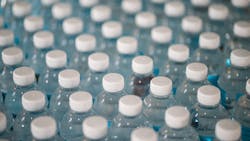American Beverage Industry Marks First Year Of Every Bottle Back Initiative
Actions are underway in cities to invest nearly a half-billion dollars on modernized recycling infrastructure and consumer education that will reduce the plastic footprint of America's beverage companies by increasing the amount of plastic bottles that are collected and remade into new ones.
WASHINGTON, Oct. 30, 2020 /PRNewswire/ -- The first year of a breakthrough effort by America's leading beverage companies to boost the recycling of plastic bottles saw the initiation of modernization projects in Texas, Oklahoma and Wisconsin that will help more than 349,000 households recycle nearly 38 million new pounds of polyethylene terephthalate (PET) plastic over ten years for remaking into new bottles, the American Beverage Association (ABA) announced today.
The investments are the first three of nine initial projects that we have committed funding for under Every Bottle Back, a 10-year effort by The Coca-Cola Company, Keurig Dr Pepper (KDP) and PepsiCo to marshal the equivalent of nearly a half-billion dollars to reduce the beverage industry's plastic footprint. The initiative will go toward the modernization of recycling infrastructure and to help educate consumers on the value of 100% recyclable plastic bottles in several regions of the USA.
This effort is backed by environmental and sustainability leaders World Wildlife Fund (WWF), which is helping measure the industry's progress in reducing its plastic footprint, The Recycling Partnership, which is funding collection infrastructure to expand access and supporting consumer education so households can recycle better, and Closed Loop Partners, the leading investment firm focused on the development of the circular economy and recycling infrastructure in the United States. This landmark initiative in partnership with respected environmental groups builds on the latest commitments by the beverage industry to reduce our use of new plastic, such as support for the federal Recycle and Recover acts to bolster recycling education and improve recycling infrastructure, and the ABA's joining of the U.S. Plastics Pact to work toward a circular economy for plastics.
"Despite new challenges recycling systems face as a result of the pandemic, the beverage industry is moving forward with our environmental partners and with community leaders on exciting projects to boost the collection of our 100% recyclable bottles and cans so they can be remade into new ones," said Katherine Lugar, president and CEO of the American Beverage Association. "Every Bottle Back is our commitment to reduce our plastic footprint and ensure our plastic bottles don't end up as waste in oceans, rivers or landfills."
Over the past year, Every Bottle Back has:
- Invested $3 million in the Dallas-Fort Worth Metroplex in partnership with the Balcones Material Recovery Facility (MRF) to upgrade the recycling infrastructure and boost collection rates. Along with state-of-the-art technology aimed at enhancing load capacity, Every Bottle Back's investment in the Dallas-Fort Worth Metroplex will provide more than 282,000 households with improved recycling access and consumer education. These investments are expected to yield 30 million pounds of newly recovered, fully recyclable PET plastic over 10 years.
- Invested $390,500 in Broken Arrow, Okla., to help launch a new curbside recycling program and provide 35,000 households with carts and recycling education materials. Efforts in Broken Arrow are expected to boost collection of recyclable materials by 124 million pounds over 10 years, of which 2.1 million pounds will be aluminum and 5.8 million pounds will be PET plastic, both of which are used to make 100% recyclable cans and bottles.
- Invested $520,000 in Kenosha, Wis., to convert more than 32,000 households from an outdated plastic bag recycling system to 96-gallon, curbside recycling carts. This modernization will allow carts to be lifted and dumped into trucks via an automated arm, upgrading from the city's current labor-intensive, manual collection of bags – providing a safer environment for workers. Over the next 10 years, this investment is estimated to yield 54 million pounds of new recyclables, including 2.1 million new pounds of PET plastic and 702,000 pounds of aluminum.
"This initiative is important for improving recycling programs across the United States, and The Recycling Partnership is honored to be a part of this work," said Keefe Harrison, CEO of The Recycling Partnership. "Every Bottle Back's efforts are helping make recycling more effective, accessible, and equitable, and we look forward to building on the progress of our continued partnership with the beverage industry."
"Every Bottle Back showcases how strong partnerships can accelerate investment and progress toward a more circular future," said Ron Gonen, CEO of Closed Loop Partners. "In partnership with the American Beverage Association and others, we are modernizing and optimizing recycling infrastructure in the United States, increasing access to local communities and keeping valuable materials in manufacturing supply chains and out of the natural environment."
"After one full year of the Every Bottle Back initiative, it's clear that when companies tackle challenges together, they have the power to make a difference," said Sheila Bonini, senior vice president, private sector engagement at the World Wildlife Fund. "Our collaboration with the Every Bottle Back initiative, which pairs our expertise through ReSource: Plastic with the beverage industry's commitment to improving PET recycling in the U.S., is a model for other industries to follow."
The Every Bottle Back initiative complements other sustainability efforts underway by The Coca-Cola Company, Keurig Dr Pepper and PepsiCo that focus on designing for recyclability. These efforts are increasing the use of recycled materials and improving the collection and recycling of bottles and cans so they can be remade into new ones. In the coming years, Every Bottle Back and its partners will continue its regional investments and establish new partnerships to further its mission and protect the environment for generations to come.
